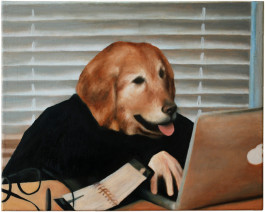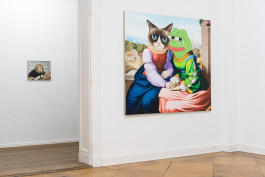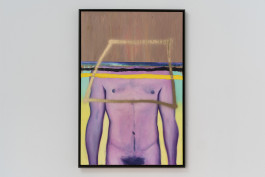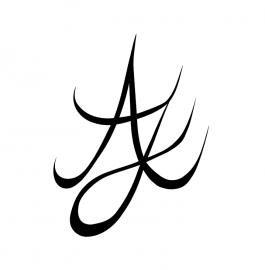

Avery Gia Sophie Schramm Schramm


On copy paste ⁞

Memes are a phenomenon of our time. Coming from the dark corners of image-boards like 4chan these decentrally organized fun images have long made it to the absolute mainstream and are even used by companies worth millions for use in their advertisement campaigns. As part of the remix culture, memes comment on everything that can be depicted in the web, which in recent debates often raised copyright issues. Yet memes never really emancipated themselves from the dark corners of the web. This becomes evident when considering 8chan, a right-wing version of 4chan. Anne Frank pornography can be found here alongside racist, sexist, anti-Muslim and antisemitic fantasies of violence. The participants will stop at nothing for a laugh. Whoever feels hurt or discriminated against is branded as spoilsport. Here a predominantly white and male community articulates itself, which likes computer games and feels unrepresented by the left-wing mainstream. Right-wing extremists recruit their followers anonymously in largely unsupervised computer game chats. This is all the more relevant, because the Christchurch assassin was inspired by such memes and even posted a link to a livestream of his terrorist attack on 8chan. Before he started the attack, the assassin said „subscribe to Pewdiepie“, which was a prominent meme at the time not only in right-wing circles. The boundaries between fun and serious matters, medium and spectator, legal and illegal, original and copy mix in such a manner that makes its manifestation a historical novum. More or less smooth are also the tran- sitions, when these images from the brew of image-boards appear on Facebook. Administrators fail to get a grip on all the new questionable content coming in. It is not always clear which content is problematic and which is not. The New Right in Germany uses this ambivalence and employs memes in order to spread radical ideas under the guise of humor. Continue reading (soon)

Avery Gia Sophie Schramm Schramm


On copy paste ⁞

Memes are a phenomenon of our time. Coming from the dark corners of image-boards like 4chan these decentrally organized fun images have long made it to the absolute mainstream and are even used by companies worth millions for use in their advertisement campaigns. As part of the remix culture, memes comment on everything that can be depicted in the web, which in recent debates often raised copyright issues. Yet memes never really emancipated themselves from the dark corners of the web. This becomes evident when considering 8chan, a right-wing version of 4chan. Anne Frank pornography can be found here alongside racist, sexist, anti-Muslim and antisemitic fantasies of violence. The participants will stop at nothing for a laugh. Whoever feels hurt or discriminated against is branded as spoilsport. Here a predominantly white and male community articulates itself, which likes computer games and feels unrepresented by the left-wing mainstream. Right-wing extremists recruit their followers anonymously in largely unsupervised computer game chats. This is all the more relevant, because the Christchurch assassin was inspired by such memes and even posted a link to a livestream of his terrorist attack on 8chan. Before he started the attack, the assassin said „subscribe to Pewdiepie“, which was a prominent meme at the time not only in right-wing circles. The boundaries between fun and serious matters, medium and spectator, legal and illegal, original and copy mix in such a manner that makes its manifestation a historical novum. More or less smooth are also the tran- sitions, when these images from the brew of image-boards appear on Facebook. Administrators fail to get a grip on all the new questionable content coming in. It is not always clear which content is problematic and which is not. The New Right in Germany uses this ambivalence and employs memes in order to spread radical ideas under the guise of humor. Continue reading (soon)


Anton Janizewski Galerie,
Anton Janizewski Galerie,